Didi Chuxing, Uber’s equivalent in the Middle Kingdom
Outshine at home with humility and poised to share its platform solution globally. A poster child of Sharing Economy.
I am a frequent visitor to China and my normal travel destinations are Beijing, Shanghai, Shenzhen and cities in Zhejiang province such as Hangzhou, Ningbo, Wuzhen and Yiwu. My usual mode of transport for intercity travel is train due to convenience and extreme reliability. Within the city limits, I mostly take a subway or metro services whose services are world class. China should be proud of their railway and it is one of the world’s best public transport networks.
But finding a Taxi for short distance, last mile travel was a daunting task during Peak time, rainy windy days and during winter before the entry of Ride and Taxi Hailing Networks like Didi, Kuaidi and Uber. According to Sina Shanghai, only 48% of passengers in Shanghai managed to find a taxi during peak hours and surge in cost of travel due to Beijing traffic congestion was $1126 per car per year. These challenges faced by the commuters and inefficiencies in the transport, created a great opportunity for ride hailing platforms like Didi Chuxing to register an explosive growth, reaching450 Million users, covering 460 cities in China within a period of 6 years. Entry of Didi Chuxing and other Taxi/Ride Hailing platforms reduce the burden on China’s traffic while boosting Sharing Economy.
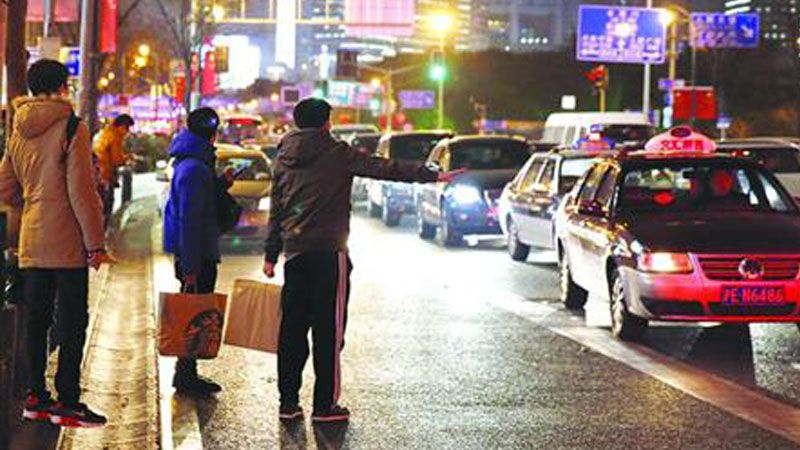
Shanghai was a very difficult place to find a taxi – Photo credit: Sina Shanghai
Didi Chuxing in China is the world largest comprehensive one stop mobile transportation platform having nearly 450 Million users across 460 Chinese cities and providing 25 million rides per day. Didi Platform handles Taxi Hailing (B2B, B2C), Private Car Hailing (C2C), Hitch (social ride hailing or P2P sharing), Chauffeur, Didi Bus, Didi Enterprise Solutions (for Vehicle Leasing Companies, fleet operators, Gas Stations, Automotive Service and Maintenance services with objective of providing a customer centric B2C, C2C, P2P hailing services). In last April 2018, Didi consolidated all its ride hailing services, fleet management services and maintenance services into one integrated platform.
This will be a revolution as this integration will not only provide a one stop service to operators but it also optimizes the resource utilization such as fuel, man power for maintenance. Didi’s integrated platform will provide an unprecedented benefits to riders and drivers as it improves quality of service and reduce cost while competitive position of Didi will be raised to greater heights.
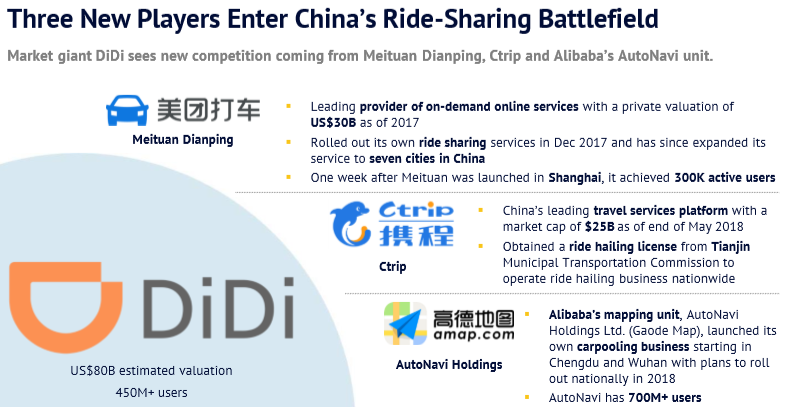
Source: China Internet Report 2018
Consolidation of Didi-Chuxing and Uber-China
Didi-Chuxing has a long history of consolidation. It was born in early 2015 as a result of the merger between Tencent backed Didi Dache and Alibaba backed Kuaidai Dache. This consolidation had brought an impressive scale advantage to the merged company and the merger improved the operational efficiency significantly as it managed to leverage the best of both companies.
After competing in a level playing field, in 2016, Uber-China wound up its operation by selling it to Didi in exchange of 20% of Didi’s stake and further $1Billion as compensation. This can be considered as a smarter move on the part of Uber, as the new partnership with Didi give Uber to maintain presence in the world’s biggest market with least effort and minimum operational burden. It also gives an opportunity to the US giant to partly own one of the biggest Unicorns of the world that spread its wings globally. Alibaba and Tencent are shareholders of Didi while Baidu was a major shareholder of Uber-China. Baidu maps were used by Uber-China while Alipay and We Chat (a social media app offered by Tencent) are well integrated with Didi through API sharing. Ultimately all BAT companies (top internet companies in China, Baidu, Alibaba and Tencent), Uber (USA), Apple (USA), Softbank (Japan) became partners of the merged entity making Didi Chuxing an application rich integrated platform with a strong equity base. (In 2017, Apple invested $1Billion in Didi).
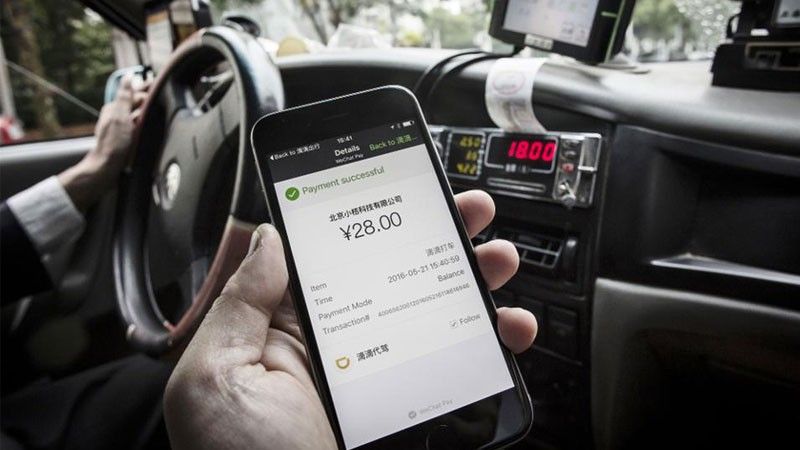
Photo Credit: Qilai Shen – Bloomberg
Vision
"One Stop Transportation Platform of the World"
Mission
Didi Chuxing's mission is to build a data-driven and user experience-drivem comprehensive one-stop transportation platform to help citizens, communities and regulators meet transportation, environmental and employment challenges; reduce congestion and pollution; and build more mobile, vibrant cities for the chinese people. Our 2018 target is to serve 30 million passengers and 10 million drives daily, within 3 minutes of waiting time for each ride - Anytime. Anywhere.
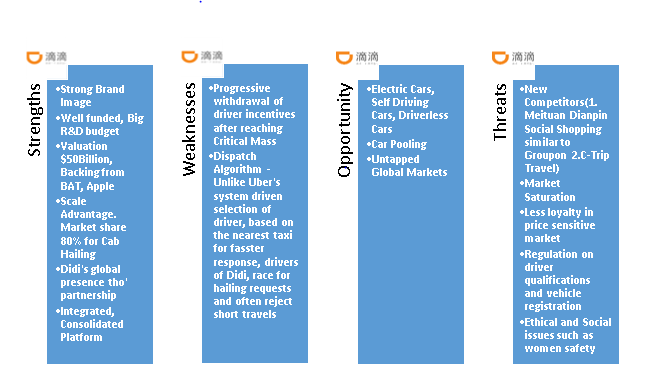
Figure 1: SWOT analysis for Didi Chuxing in Chinese market – (BAT – Baidu, Alibaba, Tencent) developed by Mothilal De Silva
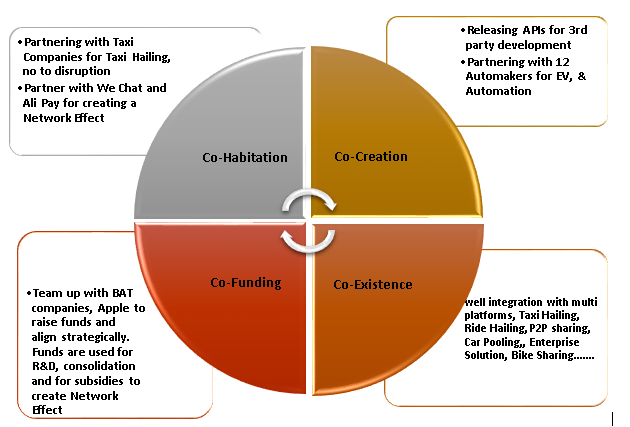
Figure 2: “Harmony can bring prosperity” (Confucian Principle) – Cooperation, Trust and Harmony based business model of Didi Chuxing (illustration developed by Mothilal De Silva)
The strategies and business principles adopted by Didi based on cooperation, trust and harmony helped them to become the undisputed leader in China. The strategies are elaborated below as illustrated in the above pictorial.
Co-Habitation – Win-Win Business Models of Didi
B2B Business Model
Didi's business model was by far different to Uber. Didi had not disrupted the traditional Taxi business, run by established Taxi companies. Chinese shared mobility platforms like Didi are not Digital Disruptors, Instead Didi is complementing traditional taxi business by providing them the shared mobility platform that connect the driver and user. But Taxi business need to adapt and digitalize its business fast. This anti disruption move was welcome by the Chinese Government and its Regulators. Out of 17 million drivers who use Didi platform, 4 Million are from defunct Coal Mines or Steel Mills, closed due to environmental reasons and overcapacity and 3.9 Million are retired soldiers. Didi's non-disruptive taxi operation and cohabitation business model not only assured the job security of these vulnerable segments but also protectedthe incumbent taxi companies economically.
Integration with We Chat
We-Chat is far more than a social networking platform and it is used as an application to order food, book hotels, buy a rail ticket or an air ticket, Groupon style group buying via Meituan via its We Chat Wallet by passing native apps. This partnership generate more than 20million Didi bookings per month by connecting close to 1000 Million active monthly users. This is similar to Uber's tie up with Facebook Messenger
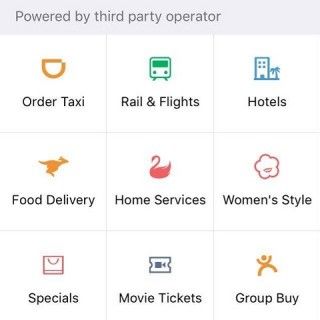
Integration with We Chat Image
Integration with AliPay, We Chat Wallet
Percentage of credit card usage in China is relatively low. Therefore with the proliferation of Alipay and We Chat Wallet among Chinese, create more user demand for O2O services like Didi-Chuxing thanks to its integration with two biggest payment modes. According to McKinsey Chinese iConsumer Survey, 68% mobile internet subscribers use digital payments such as WeChat Wallet and Alipay compared to 15% in the USA.
Co-Creation
Co-creation with other Developers by releasing APIs.The app developed by KTV/Baidu using Didi’s KPIs is a classic example for releasing APIs to 3rd party developers to increase customer’s choice, improve customer convenience and for customer centric Co-Creation. (Calling a driver using an easy to push button, say when you are drunk in a KTV, making the driver turnaround time is less as the call goes to drivers closer to KTV). Initially, it had given access to its APIs to WeChat, Alipay and few others. Later it had opened to all. Didi forged partnerships with 12 automakers such as Renault-Nissan-Mitsubishi alliance, Kia, Chang’anBAIC and JAC to develop purpose-built Electric Vehicles (EV) for Didi’s vehicle fleets. This effort is further incentivized by the Government subsidy for pollution control and fuel optimization. In collaboration with the partners, Didi will develop EV support infrastructure including fleet operation and vehicle charging for shared mobility and energy optimization backed by AI driven intelligent Didi platform. Didi is working with partners to shape the future of car industry driven by automation, intelligent networking, AI and Big Data. In parallel to EV, Didi is developing an eco-system for autonomous vehicles by leveraging its core strength of having a user entry channel and heaps of user data.
Co-Existence
Co-Existence of different applications on a single Platform in an integrated fashion to achieve Fulfilment Efficiency and Platform Synergy – Didi Chuxing is the world’s largest comprehensive one stop mobile transportation platform.
Co-Funding
Didi’s Tech Titan investors like Alibaba, Tencent, Softbank and Apple had entered into long term “Strategic Collaborations” instead of seeking short term rate of return. As illustrated below, the benefits are mutual and partners grow with Didi in tandem leveraging each other’s services. These funds are utilized for following. Figure 3 illustrates the mutual benefits and win-win partnership models.
- Funds are utilized to Increase the global reach by acquiring and forging alliances with ride hailing companies in overseas such as Grab (South East Asia), Ola (India), Taxify (EU), Lyft (USA), Careem (Middle East), 99 (Latin America). Airline Code Sharing (Esque) type of cross operator booking had been planned through the current status is not very clear.
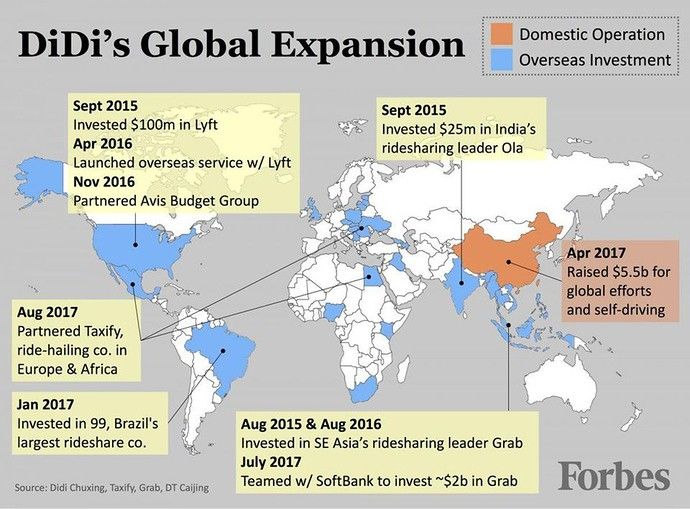
Didi’s International Strategy, Source: Forbes 03/08/2017
- Moving into other verticals. Didi diversified and introduced new services like Food Delivery services, Fleet Management, Hitch Hiking, Electric and Driverless Cars by leveraging the integrated Didi Core and Service Platforms.
- R&D, especially on driverless vehicles and Intelligent Traffic Management to reduce congestion through AI, Big Data and Machine Learning
- To increase Networking Effect by enhancing existing platform features and conducting promotions to widen Driver – Rider network by offering promotional incentives.
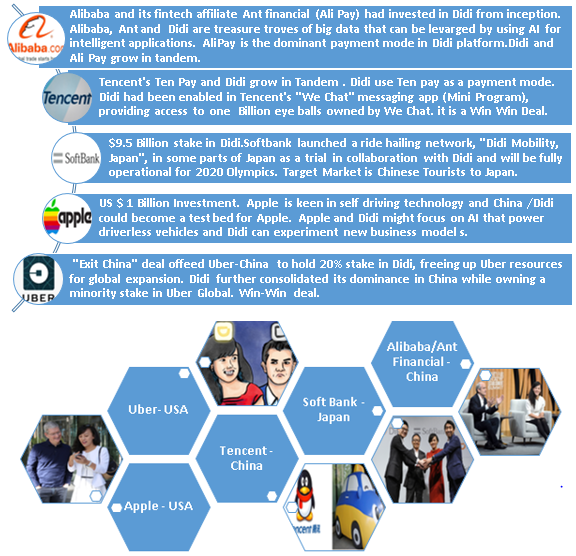
Figure 3: Didi’s investors and shareholders have a mission of growing together that goes beyond short term Return of Investment (illustration developed by Mothilal De Silva)
Conclusion and Takeaways
China is in the midst of transformation from an export and investment led macro-economic model to a consumption led model. Sharing Economy and Digital Economy driven by start-up companies like Didi and BAT companies can stimulate the macro economy of China by increasing consumption, productivity and employment generation.
Didi’s raison d’etre is making the transportation more convenient and effortless and to bring the drivers and riders together in a frictionless manner to create a networking effect. The consolidation of the rival platforms and establishing the leadership position in the home country and in the region is a unique achievement. Didi is magnanimous in victory and always look at the ways of exploring creative win-win solutions in their battles without killing the competitors or going for disruptions to wipe out the incumbents. They also have built a collaborative eco system and an integrated platform that stand test of the time and ready for remodelling the industry by introducing EVs and driverless vehicles.
Share This
Details
Mothilal is a Co Founder of Internet Plus Asia, a co-creation platform for tech start-ups in Asia. Prior to this he was a Chief Executive Officer, Chief Strategy Officer, Chief Corporate Officer and Chief Operating Officer of number of Telecommunications and IT companies in Asia and Pacific regions for over 20 years. He is a turnaround specialist and a strategist. As CEO and C level executives, he was responsiblefor transformation and turning around many telecos. He was also instrumental in winning many international awards for these companies such as GSM awards in 3 consecutive years, International Asia Pacific Quality Award, Asia CSR award. He has obtained the Doctor of Business Administration from PPA Business School, Paris, receiving a Distinction for his DBA research, "Corporate Venture Capital as an engagement model to Co-create 5G ready services in Telco - Startup collaboration"











